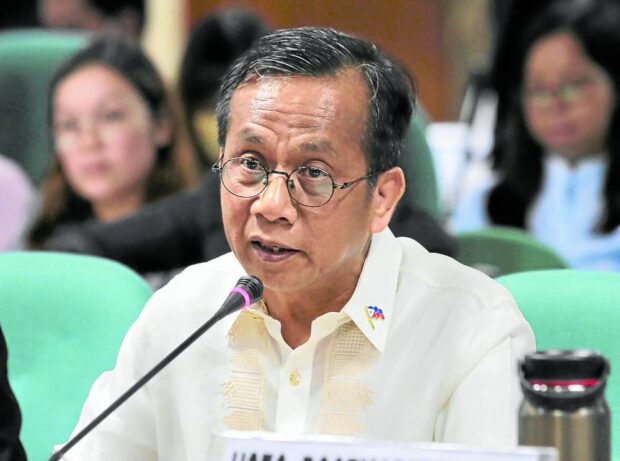Gov’t on ‘poverty’ poll: Typhoons to blame; 4Ps can ease woes

Socioeconomic Planning Secretary Arsenio Balisacan —Senate PRIB
With nearly half of Filipino families considering themselves poor, the Marcos administration is banking on programs such as Pantawid Pamilyang Pilipino Program (4Ps) and the nationwide food stamp scheme to bring down the number of families living in poverty.
Socioeconomic Planning Secretary Arsenio Balisacan on Thursday blamed the series of typhoons that struck the country as one of the reasons why 48 percent of Filipinos that the Social Weather Stations (SWS) surveyed in September considered themselves poor.
Based on weather bulletins posted on the Philippine Atmospheric, Geophysical and Astronomical Services Administration’s Facebook page, there were six typhoons that struck the country from June to September, namely “Chedeng,” “Egay,” “Falcon,” “Goring,” “Hanna,” and “Jenny,” as well as Tropical Storm “Dodong” and Tropical Depression “Ineng.”
“We note that the SWS September survey was conducted after a series of typhoons hit the country, which also affected food prices and directly impacted families who lacked the means to cope with the increase in prices,” a statement from the Presidential Communications Office quoted Balisacan as saying in response to results of the SWS survey released last Tuesday.
“As we noted earlier, poverty measures based on respondents’ perceptions are sensitive to inflation, particularly for essential commodities. Food inflation in September was higher than in June this year due to the supply disruptions,” added Balisacan, who is also director general of the National Economic and Development Authority (Neda).
Article continues after this advertisementUp by 3 points
Conducted from Sept. 28 to Oct. 1, 2023, using face-to-face interviews among 1,200 adults, the SWS survey found that 48 percent of Filipino families rated themselves as “poor,” while 27 percent rated themselves as “borderline poor.”
Article continues after this advertisementThose who rated themselves as “poor” increased by 3 percentage points from 45 percent in the survey done in June 2023 due to increases in all areas, especially in Mindanao where it rose sharply to 71 percent from 54 percent.
Meanwhile, self-rated “not poor” families fell in all areas except in Luzon outside of Manila, which jumped to 40 percent from 23 percent.
The “not poor” families fell significantly in Metro Manila (from 42 percent to 33 percent), in Mindanao (from 13 percent to 4 percent), and in Visayas (from 15 percent to 8 percent).
The survey also found that 34 percent of families rated themselves as “food-poor,” with the figure at a high 51 percent in Mindanao.
Focus on poverty
Balisacan said President Marcos’ administration remained “focused” on its priority to reduce poverty incidence among Filipinos to 9 percent by the time it steps down in 2028 through various strategies and whole-of-society approach.
Balisacan said that for the short term, the government has been implementing several measures to provide immediate assistance to those in need, including the rollout of the food stamp program (FSP), the removal of pass-through fees for vehicles transporting goods, and the distribution of cash aid through the Rice Farmers Financial Assistance program, specifically targeting the poorest individuals.
DSWD response
The Neda chief added that the administration prioritized policies and programs aimed at generating more and higher-quality jobs as this was the most robust and effective approach to reducing poverty.
He said the Marcos administration has also implemented measures to accelerate these efforts, such as ratifying the Regional Comprehensive Economic Partnership, establishing green lanes for strategic investments, and streamlining project approval procedures, among others.
The Department of Social Welfare and Development (DSWD) on Thursday said it also hoped that its two flagship programs would bring down the number of poor in the country.
Social Welfare Secretary Rex Gatchalian, responding to the SWS survey results, said he was optimistic that the agency’s 4Ps and FSP would help in alleviating the plight of poor Filipinos.
Under the FSP, which is under pilot-testing, a household will be issued a card with P3,000 worth of food credits renewable monthly for the purchase of goods in select stores, particularly the government-run Kadiwa centers.
The other program that the DSWD chief expects to improve the lives of Filipinos who consider themselves as poor was the 4Ps.
For the 4Ps, the agency announced last week that it retained a total of 761,150 households in the program after conducting a reassessment.
A total of 339,660 households have graduated from the program and were already tagged as “nonpoor,” according to the DSWD.